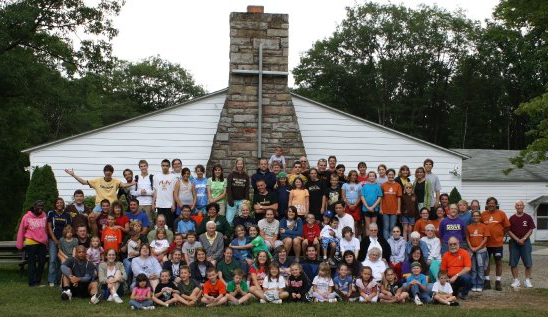5 Important Reasons to Get Members to Camp
 The Best Investment A Small Church Can Make
The Best Investment A Small Church Can Make
Many denominations have invested in land and the infrastructure to provide summer camps for their congregations. Often this is considered to be something for the kids — fun in the great outdoors with a little spiritual enrichment around the campfire at night. A summer break for the parents!
Church camps are a greatly overlooked resource for all church members—especially small churches.
Church camping is hands down the best investment in the future a small church can make, yet many churches do little to promote involvement.
At Redeemer, we encouraged our families to attend family camp—growing the skills of adults while creating important bonding opportunities for families and church members.
Church camp is an investment in your congregation’s future—and your ability to achieve those lofty missions!
Here’s why.
1. Camp actively nurtures spirituality.
Clergy often do not recognize just how scary spirituality is for lay people.
Lay people live in the secular world. We are expected to keep our spirituality to ourselves.
Clergy live in a culture where society expects them to talk in terms of God and faith. They won’t be criticized in public for speaking from a Christian point of view.
Lay people are encouraged in our faith on Sunday and discouraged the other five days of the week. We risk being labeled—“the church lady,” “the Jesus freak.” The labels CAN hold us back from promotion in our world.
This affects lay Christians’ spiritual confidence.
While society lures us away, camp can pull us back. For five or six days, in the company of other spiritual seekers—each on our own faith journey—we lay people can charge our spiritual batteries without fear of judgment.
2. Camp is a process of self-discovery.
Speaking of judgment—church culture can be unintentionally limiting. While most churches encourage involvement it is usually in a vetted way. If your skill set happens to include singing alto, there will be a place for you in the choir. But what if you play the tuba!
The Church may never ask us to do what we are really good at. They may not know us well enough —even after years of involvement. Really, how much can you learn about another person by attending worship and potluck dinners!
Sometimes we, ourselves, have yet to discover our full potential. We are Peters waiting for someone to come along, call us, and give us a chance. Often it never happens.
Church camp gives lay people the opportunity to explore. There will be less structured worship and all kinds of activities—crafts, service, music, acting, sports, challenges, etc.
3. Camp nurtures lay leadership.
Strengthened as individuals, your members will return to your congregation pumped to serve. One year, three of our boys were so excited with the songs they learned at camp that they just had to stand up in front of the congregation and teach them. This was the first time they led the congregation but it wasn’t the last time!
Adults who have been to camp are equally more likely to step forward and lead. It may not be in worship. They may forge an entirely new direction for your congregation.
4. Church camp provides a new environment.
This was important to Redeemer. Many of our members were recent immigrants. They knew little about America outside the urban scene. At church camp, they saw a different side of their new home.
Actually, some of our older members were uncomfortable leaving the lit streets of the city. Camp helped them, too.
As a neighborhood church (like most churches) we could get caught up in the local scene. Getting away for even a few days helped us see our church in a different way—as something bigger than ourselves.
The change in environment can be equally important to all congregations. Camp is an opportunity to put aside the cellphones and laptop/pads for a few days, to focus on relationship with God, and break out steer out of our ruts toward the future.
5. Camp is one of the only places where congregations interact.
Denominations sponsor occasional seminars—usually lasting a couple of hours. Relatively few attend. Camp is one place Christians interact for several days. Powerful stuff.
Some congregations go to camp as a congregation, holding retreats for just their community or for just their youth.
The real strength in getting your congregation involved in church camping is the opportunity to interact with members of other congregations—strengthening one another. I suspect that even church camps haven’t fully developed this. There’s a lot more they could be doing with their unique status in church structure. But even so, when your families eat, play, worship and learn together for five or six days with other Christian families, they bring new ideas back to your congregation.
Redeemer’s commitment to church camping helped create a congregation of leaders—which the greater church didn’t know what to do with. We invested in our future wisely by subsidizing getting our families to camp right up until our denomination took all our resources to subsidize themselves!
Talk about squandering!
